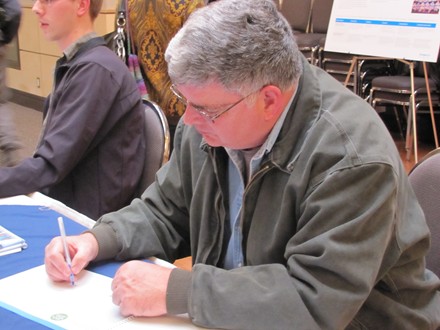Public Speaks Up on Long Term Plans for B.C. Hydro
By 250 News

P.G. resident Nick Chapman fills in his comments on the B.C Hydro IRP
Prince George, B.C. - The public consultation process for B.C. Hydro's long term "Integrated Resource Plan" (IRP) continues and last night, an open house was held in Prince George.
The IRP hopes to outline Hydro's plans to make sure there are resources in place to meet the electricity demands for the next 20 years.
The public was asked to focus on five areas:
- Conservation and Efficiency
- Electricity Generation Options: which includes a mix of bio-mass, run-of-river, wind, and dams(Site C), natural gas, and new technologies such as tidal and wave.
- Electrification: as many sectors move away from fossil fuels ( such as transportation) the IRP will try to look at how that change will impact demand for electricity
- Transmission Planning: what will need to be done in the way of transmissin line development to meet the demand for electricity over the next 30 years
- Export Market Potential: The Clean Energy Act includes the objective that B.C. be a net exporter of clean or renewable power.
Basil Stromberg is one of the B.C. Hydro IRP planners. He says the feedback during this round of public consultation has been varied "Generally speaking people are interested in conservation. But we probably can't meet all of our demand growth with energy conservation. There's been lots of interesting discussion about the different resource options available. There's been lots of interest in Site C, and there has been diverse opinion about what we should do with Site. C." Site C is a multi- billion dollar project that would put a dam on the Peace River near Ft. St. John.
Stromberg says people are genuinely surprised that B.C. Hydro cannot meet the gap between the power it can supply and the demand with just one resource "It's news to them that we have to mix resources and really it's not just one resource." According to the workbook distributed to those who attended the open house, run -of-river would be the cheapest power production at a cost of about $58-$200 per MWH of electricity. Large scale solar energy would cost between $351 and $410 per MWH, and Site C would be in the $85 per MWH range, however, that estimation is based on a decades old design which pegged the cost at $6.6 billion dollars and that cost has yet to be finalized.
Stromberg says although there is a new leader of the B.C. Government, the questions being asked of the public are "Fairly fundamental. Maybe the timing is good because the government has asked us to go out and consult and hear what people have said, and sum it up for them. So it's probably a good time for the Ministry to be looking at this with fresh eyes."
Nick Chapman was one of the people who attended last night's session, he doesn't support independent power production and doesn't like wind turbines. He says his input for B.C Hydro is to go ahead with Site C.
Attending an open house is not the only method in which people can express their opinions on how B.C. Hydro should plan for the future. The public consultation is into its second stage now. A draft report of all feedback will be produced once the April 30th deadline for input has passed. Then a third stage will take place this fall when B.C Hydro will ask stakeholders to look at the preliminary recommendations after which a final report will be presented to the government at the end of this year.
Anyone wanting to provide feedback can do so by clicking here and selecting the preferred feedback method.
Previous Story - Next Story
Return to Home









